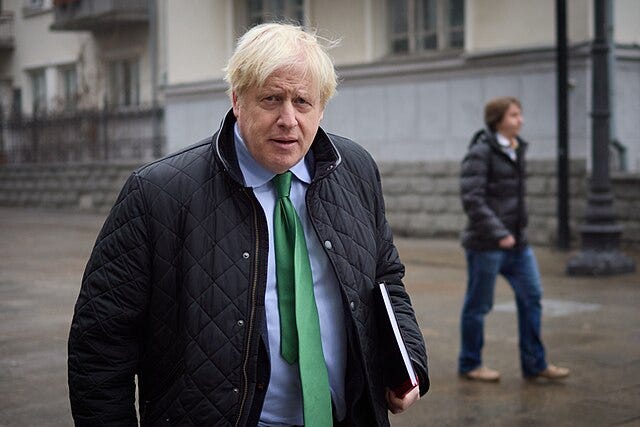Despite the past 13 years of ‘conservative’ government, it has long been argued that there is no right-wing political choice in British politics. This does not mean just a lack of centre-Right alternatives to the Tories, but a lack of right-wing parties full stop. It is the Conservative Party’s chronic fear of conservatism that has turned 2019’s healthy 80-seat majority into the cast-iron certainty of electoral oblivion. Large-scale polls suggest that the Labour Party is on course for a 140-seat landslide, with predictions that Sunak’s Tories could be reduced to a mere 129 seats. With defeat all but inevitable, the old arguments that small or new political parties ‘split the vote’ are now defunct. Instead, the question has to be where exactly does the right-wing vote find a berth?
One man with an answer to that question is Mr. Brexit, Nigel Farage. After much ‘umming’ and ‘ahhing’ over recent months over a possible political comeback, Farage has offered the olive branch to former Prime Minister Boris Johnson, alluding to the potential for a new centre-Right alliance with both Brexit luminaries at the helm, naturally:
https://twitter.com/Nigel_Farage/status/1667870223825874944?s=20[
Farage’s perspective is not without reason. In the first instance, he believes that the “gap for another insurgency is actually bigger than it was 10 years ago.” The progress of his former vehicle, UKIP—which breached 20% in the opinion polls—was halted by the Brexit referendum. But now, the landscape could be set for a similar party to go further. In addition, Farage has already hinted that initial conversations he has had suggest a minimum of double-digit defections from the Conservative Party.
Tory civil war
Then there’s the question of Johnson himself. On the face of it, having jumped before he was pushed—resigning his Uxbridge and South Ruislip seat rather than await the damning findings of the Privileges Committee on whether he misled Parliament over lock down parties—one might suppose Johnson had had his fill of the limelight. But then, that would be to underestimate Johnson’s natural affinity for political reinvention. According to Matthew Goodwin, co-author of National Populism: The Revolt Against Liberal Democracy, Johnson’s resignation is a “calculated move … with one eye on his future after a likely Conservative defeat in 2024.” Goodwin also states he would not be at all surprised if Johnson “also has one eye on setting up a new populist movement.”
While the task for small or fledgling parties to gain traction is nigh on impossible in British politics—thanks to the stranglehold of the first-past-the-post voting system—there are moderate grounds for optimism this time around. Farage has officially gone public with his intention to re-enter the fray, which has not happened previously, notwithstanding his honorary presidency of Reform UK. And whatever else might be said about him, Farage’s track record of leading insurgencies is second to none. It was he, after all, who won the European election in 2019 with 31.6% of the vote, having formed the Brexit Party just six weeks previously.
While Johnson has previously snubbed Farage’s offers for electoral pacts, he may find himself more compromised now, with little chance of resuming his leadership of the Conservative Party. The Tory civil war shows no signs of abating, and having effectively gifted Labour his Uxbridge seat, there are likely to be elements within the party that consider Johnson simply too toxic for a potential second run as leader.
The wider circumstances may also prove ripe for a possible alliance on the Right. By-elections have now been called in three Tory constituencies (after Nadine Dorries and Nigel Adams resigned alongside Johnson), and experts are predictingthe Tories will lose all three. This is likely to mount pressure on Rishi Sunak, as an emboldened Keir Starmer begins calls for a general election.
Perhaps more than anything, however, is the simply disastrous state of the nation. It is certainly in its worst shape in my lifetime. From calamitous lockdowns, to out-of-control tax and inflation, and a resolute refusal to get to grips with immigration, something’s got to give within government. Esteemed psephologist Sir John Curtice has expressed doubts whether Johnson and Farage will join forces, but that if they did it would be “Sunak’s worst nightmare.” And it is nightmares that may prove the deciding factor in the establishment of a new alliance: the fear of red-wall Tories in danger of losing their seats may be precisely the impetus such an undertaking needs to get off the ground.
Former Conservative minister turned Brexit Party member, Ann Widdecombe, has predicted that not only will the Conservatives lose all three upcoming by-elections, but that the Tories are finished: “We’ve had the Brexit Party, we’ve got the Reform Party, there are a lot of other very small centre-Right parties and I think it is time for the centre-Right now to coalesce into one party.” She has at least been proved partly right, as the smaller parties Reclaim and Reform UK agreed a deal to support each other yesterday:
https://twitter.com/reformparty_uk/status/1668249819637325824?s=20
Could this be a portent of things to come? While the potential avalanche of revolution from Johnson allies within the Conservative Party failed to materialise, a Farage-Johnson alliance is sufficiently heavyweight to get the ball rolling again. Johnson would do well to recall that his 2019 success was in no small way attributable to Farage stepping aside to get Brexit done. Perhaps this is a chance to remind Alexander Boris de Pfeffel Johnson of the custom of noblesse oblige; perhaps this is an opportunity to return some optimism to the British people and to small ‘c’ conservatives, who have had precious little to celebrate since the Brexit referendum.
This piece first appeared in The European Conservative, and is reproduced by kind permission.
If you enjoy my work, please consider buying me a coffee - it would really help to keep me going. Thank you!





Sounds like a good plan but don't forget Britain First they are gathering a lot of support and could be the dark horse in upcoming elections.